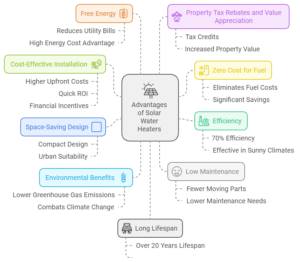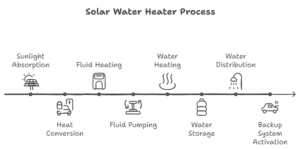With rising energy costs and growing environmental concerns, many homeowners are looking for better solutions. One popular option is the solar water heater. This system uses sunlight to heat water, which can lead to big savings on energy bills and a smaller carbon footprint.
In this blog, we will discuss the advantages of solar water heaters. You will learn how they can lower your utility bills, increase your home’s value, and help you live more sustainably. Join us to see how this technology can make your home more efficient and eco-friendly!
What is a Solar Water Heater?
A solar water heater is a system designed to harness solar energy for heating water for various applications, including household use, swimming pools, and space heating. The system typically consists of:
-
Solar Collectors: These absorb sunlight and convert it into heat. They can be flat-plate collectors, evacuated tube collectors, or integral collector-storage systems.
-
Storage Tank: This holds the heated water until it is needed. The tank is often insulated to minimize heat loss.
-
Piping and Pumping System: This circulates water between the collectors and the storage tank, ensuring efficient heat transfer.
-
Sunlight Absorption:
-
Solar collectors capture sunlight and convert it into heat.
-
Heat Transfer:
-
The heated fluid (water or antifreeze) circulates through the collectors. In direct systems, water is heated directly; in indirect systems, heat is transferred via a heat exchanger.
-
-
Storage:
-
The hot fluid or water is stored in a tank for later use.
-
-
Distribution:
-
Hot water is delivered to faucets and showers through a piping system.
-
-
Backup Heating:
-
Backup systems (electric or gas) provide hot water when sunlight is insufficient.
-
Advantages of Solar Water Heaters

-
Zero Cost for Fuel:
-
-
Once installed, solar water heaters rely on sunlight, which is free. This eliminates fuel costs associated with traditional water heating systems, leading to significant savings over time.
-
-
Efficiency:
-
-
Solar water heaters can achieve efficiencies of 70% or higher, depending on the design and location. They are particularly effective in sunny climates, where they can provide ample hot water throughout the year.
-
-
Cost-Effective Installation:
-
-
Although the upfront costs can be higher than conventional systems, the savings on energy bills can lead to a return on investment within a few years. Additionally, many regions offer financial incentives to offset installation costs.
-
-
Space-Saving Design:
-
-
Modern solar water heaters are designed to be compact, making them suitable for various installation locations, including rooftops and small backyards. This is especially beneficial in urban areas where space is limited.
-
-
Environmental Benefits:
-
-
By reducing dependence on fossil fuels, solar water heaters significantly lower greenhouse gas emissions. This contributes to a healthier environment and helps combat climate change.
-
-
Low Maintenance:
-
-
Solar water heaters have fewer moving parts than traditional systems, which translates to lower maintenance requirements. Regular checks and occasional cleaning of collectors are typically all that is needed to keep the system running efficiently.
-
-
Free Energy:
-
-
Once the system is operational, it provides free hot water, which can drastically reduce monthly utility bills. This is particularly advantageous in regions with high energy costs.
-
-
Reduced Carbon Footprint:
-
-
Utilizing solar energy significantly reduces a household’s carbon footprint. This not only benefits the environment but also aligns with the growing consumer preference for sustainable living.
-
-
Property Tax Rebates and Value Appreciation:
-
-
Many local governments offer tax credits, rebates, or other financial incentives for solar installations. Furthermore, homes equipped with solar technology often see an increase in property value, making them more attractive to buyers.
-
-
Long Lifespan:
-
-
Solar water heaters are built to last, with many systems functioning effectively for over 20 years. With proper maintenance, the lifespan can be extended even further, providing long-term benefits.
-
-
Quick and Easy Installation:
-
-
The installation process for solar water heaters is often straightforward and can be completed in a matter of days. This allows homeowners to quickly start benefiting from reduced energy costs.
-
-
Consistent Hot Water Supply:
-
-
Designed to provide a reliable supply of hot water, solar water heaters can meet household demands year-round. In colder climates, systems can be equipped with backup heating options to ensure hot water availability during cloudy periods.
-
Additional Advantages of Solar Water Heaters
1. Environmental Benefits:
Lowers greenhouse gas emissions and promotes the use of renewable energy.
2. Low Maintenance:
Requires minimal upkeep due to fewer moving parts compared to traditional systems.
3. Increased Property Value:
Homes with solar water heaters may have higher resale values and attract eco-conscious buyers.
4. Job Creation:
-
The growth of the solar industry fosters job creation in installation, maintenance, and manufacturing, contributing positively to local economies.
5. Government Incentives:
-
Many governments provide incentives, grants, or rebates to encourage renewable energy adoption, making solar water heaters more affordable and accessible.
-
Conclusion
In conclusion, the advantages of solar water heaters are significant and multifaceted. By utilizing solar energy, homeowners can enjoy substantial savings on energy bills while reducing their carbon footprint and reliance on fossil fuels. Additionally, these systems require low maintenance and can enhance property value, making homes more attractive to eco-conscious buyers.
Investing in a solar water heater promotes energy independence and provides a reliable supply of hot water, all while supporting a more sustainable future. Embrace the benefits today and contribute to a cleaner, greener world!
FAQs Related Advantages Solar Water Heater
Q 1. How much can I save on my energy bills with a solar water heater?
Ans. The savings can vary based on location, energy prices, and system efficiency, but homeowners typically see a reduction of 50-80% in their water heating costs.
Q 2. What maintenance is required for solar water heaters?
Ans. Solar water heaters require minimal maintenance, such as annual inspections, cleaning of the solar collectors, and checking fluid levels. Regular maintenance ensures optimal performance and longevity.
Q 3. Are solar water heaters effective in colder climates?
Ans. Yes, modern solar water heaters are designed to work efficiently even in colder climates. They often include insulation and freeze protection mechanisms to ensure functionality year-round.
Q 4. How long does it take to install a solar water heater?
Ans. Installation typically takes 1 to 3 days, depending on the complexity of the system and the existing infrastructure. A professional installer will provide a timeline based on specific conditions.
Q 5. What incentives are available for installing a solar water heater?
Ans. Many regions offer tax credits, rebates, and grants for solar water heater installations. It’s important to check local and federal programs to maximize your savings.
Q 6. Can I install a solar water heater myself?
Ans. While DIY installation is possible, it is highly recommended to hire a professional. Proper installation ensures safety, efficiency, and compliance with local building codes.
Q 7. What is the lifespan of a solar water heater?
Ans. Most solar water heaters have a lifespan of 15 to 25 years, depending on the type and maintenance. Regular upkeep can extend the life of the system.
